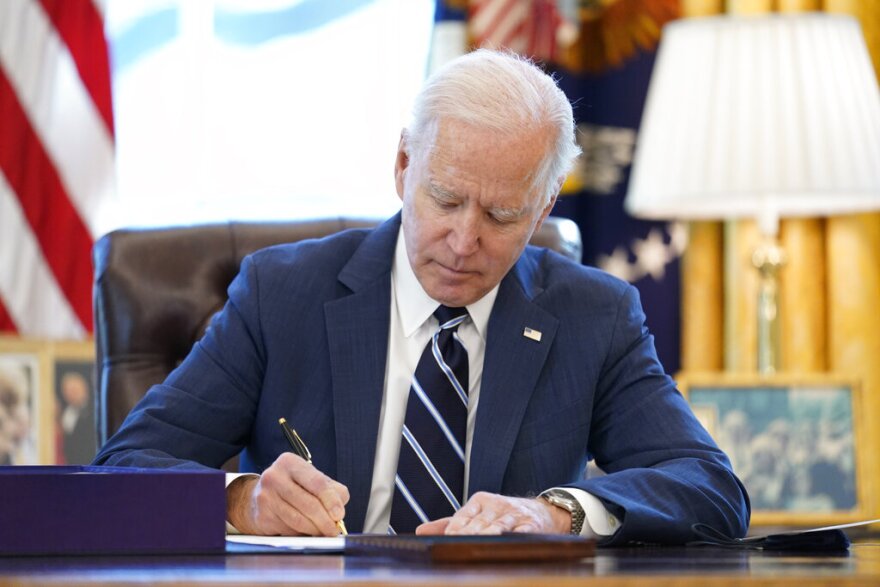Southern Nevada municipal governments have more than a half-billion dollars in federal pandemic relief funds to allocate before the end of next month. They are getting plenty of suggestions on how to spend it.
A recent Clark County Commission meeting saw a line of speakers with ideas on where the money should go: supporting education, bridging the digital divide, assisting small businesses and workers, stabilizing the rental market, and rewarding frontline workers.
Workshops and meetings with stakeholders have been held as elected officials near an Aug. 30 deadline to decide on where the American Rescue Plan funds will go.
Areas expected to be addressed in the final funding packages include assisting hard-hit neighborhoods and households, affordable housing, small business support and workforce training, healthcare, and infrastructure.
Nevada state Treasurer Zach Conine, who has been involved in earlier COVID grant awards, said the amount of federal money available will allow for a down payment to “build the Nevada that we deserve to live in.”
Gov. Steve Sisolak, legislative leaders, and Conine developed the “ Every Nevadan Recovery Framework,” a strategy for using American Rescue Plan Fund that it says “puts individuals and families right at the center.”
Conine encouraged those with ideas, both broad and specific, on how to use the funds or improve the state to bring it to the attention of government officials.
“We've gotten hundreds of submissions from Nevadans all around the state,” he said.
Earlier this month Sisolak declared the $100 million in state grants already awarded to nearly 10,000 Nevada businesses and organizations “the largest small-business program in Nevada history.”
Peter Guzman, president of the Latin Chamber of Commerce, pointed to the success of that program and said small-business owners should get strong consideration for future support as well.
“Grant dollars to small businesses help them stay open, keep people employed, and keep dollars turning in our community,” he told State of Nevada
He stressed that these are not handouts, and he encourages businesses to seek any grant money they qualify for.
“Remember where these dollars come from — it's our money,” he said. “It's handing you back a little bit of your money.”
Duy Nguyen, vice president and chief operating officer for the Asian Community Development Council, said Nevada’s diverse population and business community will present challenges in connecting potential applicants with available funding.
“We have a language barrier with over 40 languages and culture here right here in Nevada,” he said. “I think some of these applications and processes are even confusing to even the professional English speaker.”
Nguyen endorsed creating a process to assist applicants for funding, similar to what is seen during the census or the Affordable Care Act’s enrollment process.
He proposed “having an organization like us be the navigator for this type of assistance so that we can continue to educate folks because there's so much myth and so much misinformation out there.”
A top official with the union representing the state’s supermarket workers said Nevada should consider following other jurisdictions in awarding one-time bonuses to grocery and other essential workers.
“Most people or most businesses were on lockdown — they were told to stay home,” said Michael Gittings, president, United Food and Commercial Workers Union Local 711. “Our members were told to go to work, to continue to provide food and medicine for the community. And not only to keep going to work, but to work longer hours, longer weeks.”
Alexa Aispuro, an organizer with the environmental group Chispa Nevada, said it would be appropriate to use some of the funding to improve air quality in minority neighborhoods.
“COVID-19 is a respiratory virus that has hit communities of color harder,” she said, and the available federal funding provides an opportunity to address longstanding concerns, such as getting older, smog-producing vehicles off the roads.
The pandemic made things even harder for UNLV students looking to move past mistakes that landed them in the judicial system, a university administrator said.
“A lot of the historical barriers were exacerbated by the effects of COVID-19,” said Sunny Gittens, executive director for student engagement.
She said the university is seeking funds to expand the Rebel Rebound program that assists students looking for a second chance.
“We are requesting $2.5 million over the course of several years,” Gittens said. “This would go to fund employment opportunities for justice-impacted students, as well as direct financial support for individuals.”
Zach Conine, Nevada State Treasurer; Peter Guzman, president, Latin Chamber of Commerce; Duy Nguyen, chief operating officer, Asian Community Development Council; Michael Gittings, president, United Food and Commercial Workers Union Local 711; Sunny Gittens, executive director for student engagement, UNLV; Kevin Wong, student, UNLV; Alexa Aispuro, organizer, Chispa Nevada










